| |||||
| Decades: | |||||
|---|---|---|---|---|---|
| See also: | Other events in 1933 · Timeline of Icelandic history | ||||
The following lists events that happened in 1933 in Iceland .
| |||||
| Decades: | |||||
|---|---|---|---|---|---|
| See also: | Other events in 1933 · Timeline of Icelandic history | ||||
The following lists events that happened in 1933 in Iceland .

Erik Thorvaldsson, known as Erik the Red, was a Norse explorer, described in medieval and Icelandic saga sources as having founded the first European settlement in Greenland. He most likely earned the epithet "the Red" due to the color of his hair and beard. According to Icelandic sagas, he was born in the Jæren district of Rogaland, Norway, as the son of Thorvald Asvaldsson. One of Erik's sons was the well-known Icelandic explorer Leif Erikson.

The Church of Iceland (Þjóðkirkjan), officially the Evangelical Lutheran Church of Iceland, is the national church of Iceland. The church is Christian and professes the Lutheran faith. It is a member of the Lutheran World Federation, the Porvoo Communion, the Communion of Protestant Churches in Europe, and the World Council of Churches.

Goðafoss is a waterfall in northern Iceland. It is located along the country's main ring road at the junction with the Sprengisandur highland road, about 45 minutes from Akureyri. The water of the river Skjálfandafljót falls from a height of 12 metres over a width of 30 metres. A 1.8-mile hiking trail loops around the waterfall area.

Þorgerður Katrín Gunnarsdóttir is an Icelandic politician, who has been chairman of the Liberal Reform Party since 2017.

The Iceland national football team represents Iceland in men's international football. The team is controlled by the Football Association of Iceland, and have been a FIFA member since 1947 and a UEFA member since 1957. The team's nickname is Strákarnir okkar, which means Our Boys in Icelandic.
Fóstbrœðra saga or The Saga of the Sworn Brothers is one of the Icelanders' sagas. It relates the deeds of the sworn brothers Þorgeir and Þormóðr in early 11th century Iceland and abroad. Þorgeir is a capable and insanely brave warrior. He kills people for trifles and for sport. Þormóðr is a more complicated character; warrior, trouble-maker, womanizer and poet. The saga contains poetry attributed to him, including parts of a lay on his blood brother. It is said that a cairn called Þorgeirsdys, identifies the place of death and burial of Þorgeir. This is located on the Hraunhafnartangi peninsula, just south of the modern lighthouse.
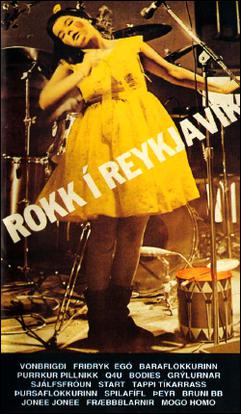
Rokk í Reykjavík is a documentary directed by Icelandic Friðrik Þór Friðriksson during the Icelandic winter of 1981-1982 and released for the local television in 1982.
Thorgeir Ljosvetningagodi Thorkelsson was a lawspeaker in Iceland's Althing from 985 to 1001.
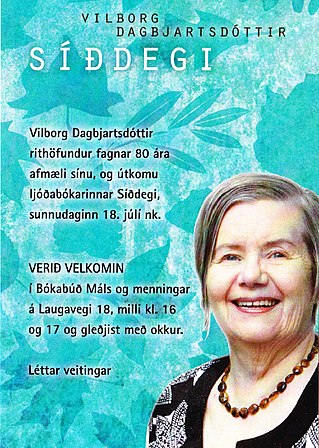
Vilborg Dagbjartsdóttir was an Icelandic writer, poet and teacher. She published her first book of poetry in 1960 and became one of the few women in Iceland to write modernist poetry. Her third book of poems, Kyndilmessa, has been described as a "breakthrough". Innovative features in her works include the use of colloquial language and images of daily life. Like Jón úr Vör she combined lyrical realism with romantic imagery. Vilborg was active in the feminist movement, and her works are concerned with the status of women in society as well as social inequality in general. She published a number of books for children, including non-fiction works and translations.
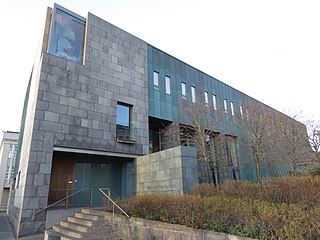
The Supreme Court of Iceland is the final court of appeal in the judiciary of Iceland. It is also the oldest of the current courts of law in Iceland and the highest of the three Icelandic court branches, the others being the District Courts of Iceland and the Court of Appeal (Landsréttur).
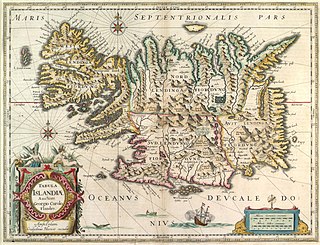
Iceland was Christianized in the year 1000 CE, when Christianity became the religion by law. In Icelandic, this event is known as the kristnitaka.
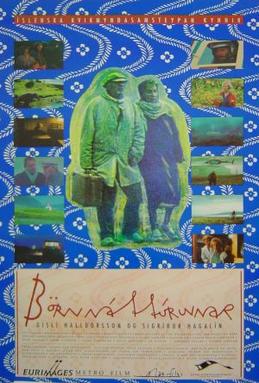
Children of Nature is a 1991 Icelandic film directed by Friðrik Þór Friðriksson. It was nominated for the Best Foreign Language Film Oscar at the 64th Academy Awards, the only Icelandic film to have ever been nominated.
Fjalar Þorgeirsson is an Icelandic football coach and former player who played the goalkeeper position. He played 5 games for the Iceland national football team during his career. He played 227 matches in the Icelandic top-tier Úrvalsdeild karla.

The White Viking is a 1991 film set in Norway and Iceland during the reign of Olaf I of Norway. The film loosely follows actual events.
Jórunn Viðar was an Icelandic pianist and composer.

Iceland competed at the 2014 Summer Youth Olympics, in Nanjing, China from 16 August to 28 August 2014.
The 2nd Edda Awards were held on 19 November 2000 at the National Theatre of Iceland. The awards were hosted by actress Steinunn Ólína Þorsteinsdóttir and TV presenter Jón Ársæll Þórðarson. The awards were broadcast live on RÚV.
Þorgeir Þorgeirson was an Icelandic writer, translator and filmmaker, one of the first Icelandic graduates of foreign film schools. In 1987 he was found guilty of defaming the Icelandic police in two newspaper articles and fined; he then sued the Icelandic state in the European Court of Human Rights, which in 1992 in an influential ruling found in his favour.
Gísli Þorgeir Kristjánsson is an Icelandic handball player who plays for SC Magdeburg and the Icelandic national team.

The Valur men's football team, commonly known as Valur, is the men's football department of the Knattspyrnufélagið Valur multi-sport club. It is based in Reykjavík, Iceland, and currently plays in the Besta deild karla, the top-tier men's football league in Iceland. The team plays it home games at Hlíðarendi located in Reykjavík. The team's colors are red and white. Valur has spent most of its time in Icelandic top flight football, having only played three seasons in the clubs history outside the top tier. Valur is one of the most successful football clubs in Iceland with 23 Icelandic championships. It holds the record attendance to a football match in Iceland with 18,243 spectators in attendance v Benfica in 1968.